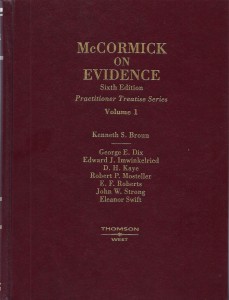Judicial Notice: The Difference Between “Legislative” and “Adjudicative” Facts
 A court accepts a well-known and indisputable fact without taking the time and trouble of requiring a party to prove it. What could be more straightforward, more commonsensical, than that? As McCormick puts it, the “oldest and plainest ground for judicial notice is that the fact is so commonly known in the community as to make it unprofitable to require proof, and so certainly known as to make it indisputable among reasonable men.”
A court accepts a well-known and indisputable fact without taking the time and trouble of requiring a party to prove it. What could be more straightforward, more commonsensical, than that? As McCormick puts it, the “oldest and plainest ground for judicial notice is that the fact is so commonly known in the community as to make it unprofitable to require proof, and so certainly known as to make it indisputable among reasonable men.”
At the same time, as with many things in the law, things are never quite that simple. For example, a court might deal with facts subject to judicial notice – facts that are either commonly known or readily verifiable — differently depending on the significance of the facts to the outcome of the case.
McCormick distinguishes between “legislative” facts and “adjudicative” facts. As McCormick explains it, judicial notice of legislative facts occurs “when a judge is faced with the task of creating law, by deciding upon the constitutional validity of a statute, or the interpretation of a statute, or the extension or restriction of a common law rule, upon grounds of policy, and the policy is thought to hinge upon social, economic, political or scientific facts.” Although a judge should have no problem with judicial notice of such facts, it would be different if the same facts were outcome-determinative; i.e., adjudicative facts. In that case, the court would not want to intrude on the province of the jury.
Although again this sounds pretty straightforward, the distinction between a legislative fact and an adjudicative one tends to “dissolve in practice.” McCormick explains why:
Assume, for example, a statute making it a crime to possess cocoa leaves or any salt, compound, or derivative thereof. If believed, the testimony of witnesses, lay and expert, establishes that defendant possessed a quantity of cocaine hydrochloride and that the item is indeed a salt, compound, or derivative of coca leaves. The last proposition is indisputable and subject to judicial notice. If this is an adjudicative fact, a federal judge would not feel free to instruct the jury that, if they were to find the defendant possessed the item, they must find the item was a proscribed one. No such compunction would obtain if it were a legislative fact. Yet one judge might visualize the question in terms of, “What is it that defendant possessed?”, which is part of the who, what, when and where litany signaling an adjudicative fact, while another judge might inquire, “What was it that the legislative intended to criminalize?”, access door to the realm of legislative facts. All of which may warn the reader that the judicial notice of fact phenomenon has many of the characteristics of an universal solvent: it cannot be totally contained in any known vessel.
